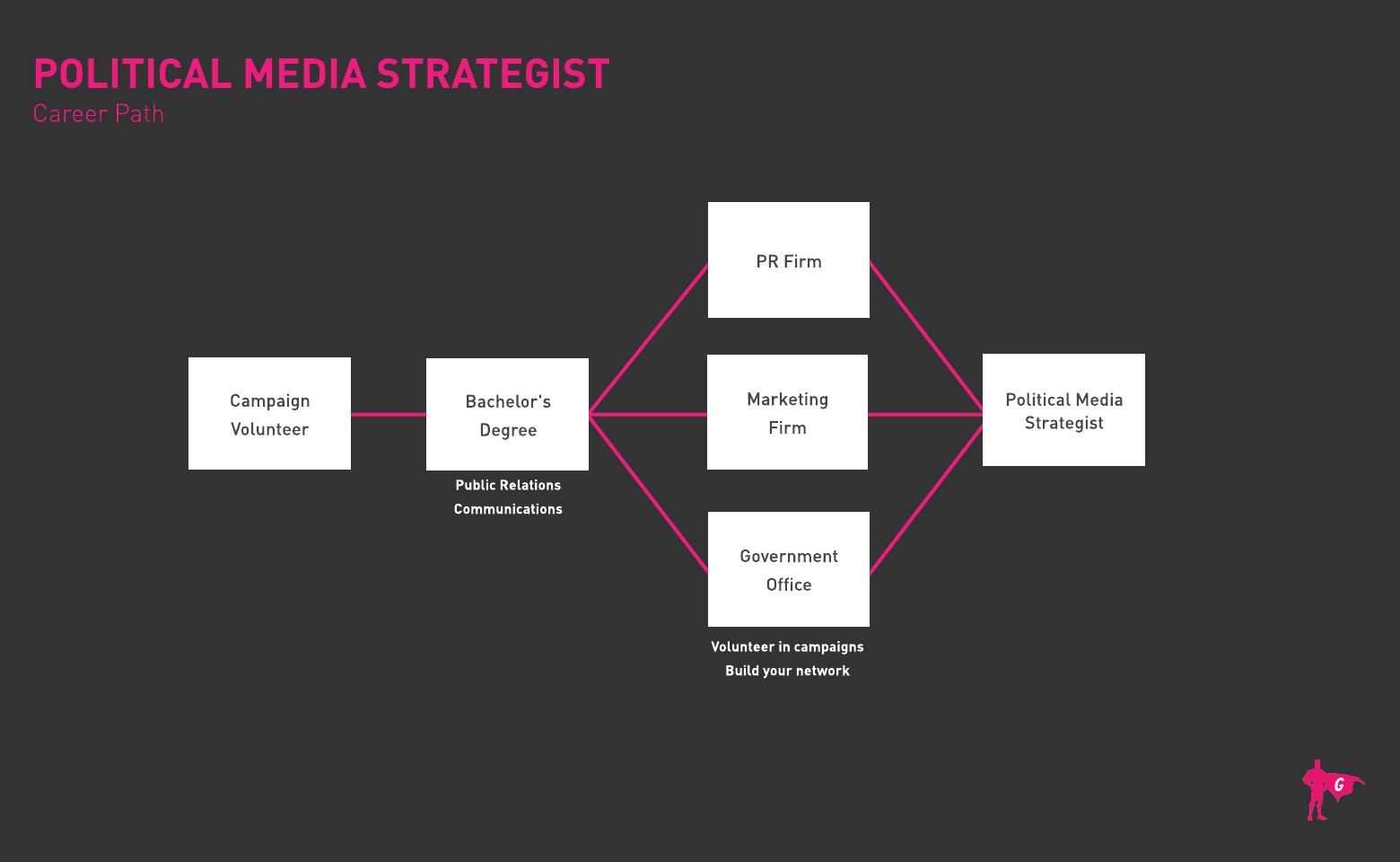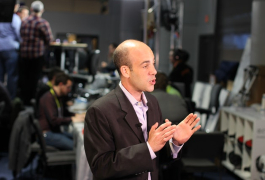Spotlights
A “Political Media Strategist” is also referred to as a “consultant,” They can sometimes be referred to as a campaign manager, but typically affect one part of a larger campaign. They may also be part of an elected official’s team after they are elected.
Political Media Strategists lead the planning of how best for a campaign to use television, radio, social media, and other forms of media to help influence voters. They are especially influential as social media has come to dominate the landscape. Job responsibilities are specific to the type of election.
If they are working for a current elected official, they will focus on the official’s current perception by the public.
Some campaigns will hire political media strategists from an outside public relations firm, or they may be independent contractors working directly for the campaign.
- Able to influence the thoughts and decisions of hundreds to millions of people.
- Building connections in the media industry.
- Able to be creative and find solutions.
A Political Media Strategist will have very different day-to-day responsibilities. They are often very important in a campaign, with responsibilities being merged with a campaign director for smaller campaigns.
- Most of their work will be in the public relations area. They will use polling and demographic data to determine the best area for campaign ads to air, how the candidate can best respond to trends, and staying in contact with local media companies. During the course of their time, they can expect to:
- Create press releases and other media information for news stations or direct delivery.
- Communicate directly with media outlets about interviews, candidate stances, and any other questions the news or similar outlets might have.
- Use polling data to determine the most effective use of campaign ads on TV, Radio, or Social Media.
- Work with the rest of the campaign to determine best use of polling data, as well as how best to administer polls.
Especially during election season, a Political Media Strategist can expect long, flexible hours. The closer to an election, the higher the workload.
Soft Skills
- Strong written and oral communication skills
- Interpersonal and relationship building skills.
- Active Listening
- Very good at public speaking
- Detail Oriented and well organized.
Technical Skills
- Sales and Marketing knowledge, especially how to promote.
- Administration, Leadership, and Management skills.
- Understanding of graphics and photo imaging software, such as Adobe Photoshop
- Database knowledge as well as data analytics.
- Able to use website creation software and facilitate development of web platforms.
- Political Campaign
- Political Office
- Educational Services
- Advertising
- Newspapers or other publications
Political Media Strategists can expect to work long, challenging hours for a campaign. They can be the main leader in overcoming a candidate’s wrong words.
Spending time volunteering for campaign’s, or working in an official’s office, can provide experience and connections to later be hired in this role. Gaining experience in a public relations firm is also helpful.
This position involves many different disciplines, so experience, networking, and knowledge are very important. You will need to develop skills in data collection and analysis, graphic design, political campaigning, and public relations.
There is an increased emphasis on data mining and social media.
- Math and Logic puzzles
- Student government
- Sharing homemade Youtube videos.
- Political Media Strategists must master several skills to be successful. Most have at least a bachelor’s degree related to public relations, marketing, communications, or political science. Many hold master’s degrees
- Experience is a key element in becoming an effective Political Media Strategist. In addition to academic requirements, it is common to learn the ropes through entry-level jobs, working in active campaigns as a volunteer, assistant, or intern
- Some students sign up for digital marketing bootcamps to knock out online media marketing credentials. A few options include:
- Harvard’s Digital Marketing Strategy
- Udacity Digital Marketing Course
- General Assembly Online Digital Marketing
- Knowledge of social media management principles is essential. Popular social apps and sites include TikTok, YouTube, Facebook, Instagram, LinkedIn, Twitter, Reddit, and Quora
- Political Media Strategists should understand concepts related to personal branding
- They must become familiar with the concerns and needs of voters and how each media platform (TV, radio, print, social) is best utilized to communicate messages
- Digital tools for media management include CoSchedule, Hootsuite, Feedly, Airtable, and TweetDeck
- Stats and analytical programs include BuzzSumo, NodeXL, HubSpot, Sprout Social, Google Analytics, and Tapinfluence
- Participate in Student Government
- Study Public Relations
- Take basic data analysis courses
- Graphic Design
- Marketing Courses
- Common courses to take include English, writing, speech, graphic design, mass communication, political science, social media marketing, data analysis, business, math, and finance
- Participate in online and in-person social forums to see what types of issues average Americans are talking about
- Get involved with debate club and student government in high school to hone relevant skills
- In college, join or start a student organization devoted to a hot political topic and practice your media strategy skills to drive interest
- Stay involved with local campaigns. Request to rotate activities, starting at the grassroots “boots on the ground level” so you can see the whole picture and engage with voters
- Read about local, state, and national campaigns in the news and pay attention to the details of what is working (and what’s not)
- Pay attention to political polls and candidate criticisms, from within and outside your party. Don’t disregard the impact of others’ opinions, whether you agree with them or not
- Get familiar with campaign budgeting guidelines and best practices
- Study popular TV, radio, print, and social media ads. Try to figure out “why” something works for the intended audience
- Learn how to interact with the media in a calm, professional manner that is good for PR
- Master the art of speaking professionally
- Read or watch tutorials on the built-in features of popular social apps and platforms
- Take online courses (via Coursera, Constant Contact, Skillshare, HubSpot Academy, Google Digital Garage, or Wordstream) to master digital media skills
- Get familiar with analytical tools and software that can display user engagement stats
- Build an awesome portfolio to hook potential employers!
- Make connections through your volunteer and intern experiences. Stay connected and keep growing your network

If you are interested in any political career, start volunteering for campaigns as soon as possible. Local and state campaigns will teach you quite a bit about how to effectively campaign. Continue to stay connected with campaigns through school, as well as the people you meet along the way.
Make sure you have a quality internship during college. It is most helpful to have one in a political field as well as in public relations. Continue to build your network and communicate with people you can help. It may take quite a few years of volunteering before you are able to be hired onto a campaign.
You can also be hired into a larger public relations firm, or into the public relations department of a corporation. These careers will provide you with an excellent setting to develop the skills needed to be a political media strategist. During this time, stay connected with local politics and you will be able to build the network necessary to find a position.
Websites
- American Association of Political Consultants
- CIA World Factbook
- Congress.gov
- Executive Orders
- Federal Register
- Govinfo
- International Public Relations Association
- Library of Congress
- National Conference of State Legislatures
- Presidential Libraries
- Public Relations Society of America
- Supreme Court
- White House
Books
- Analytic Activism: Digital Listening and the New Political Strategy, by David Karpf
- Democracy and Fake News: Information Manipulation and Post-Truth Politics, by Serena Giusti and Elisa Piras
- Re:Imagining Change: How to Use Story-Based Strategy to Win Campaigns, Build Movements, and Change the World, by Doyle Canning and Patrick Reinsborough
- Public Relations Specialist
- Nonprofit Fundraising Manager
- Copywriting
- Advertising/Promotions Manager
- Meeting and Event Planners
Becoming a political media strategist is a challenge. Some campaigns and elected officials will not have this position available – it will be part of the larger duties of a campaign manager. However, if it is a career you would like to pursue, you can work towards it.
In most educational tracks, work toward a career in public relations. During this time, stay active in political campaigns. Building a strong network is your best tool in finding this position later in your career.
Newsfeed

Featured Jobs

Online Courses and Tools

Annual Salary Expectations
New workers start around $49K. Median pay is $61K per year. Highly experienced workers can earn around $85K.






